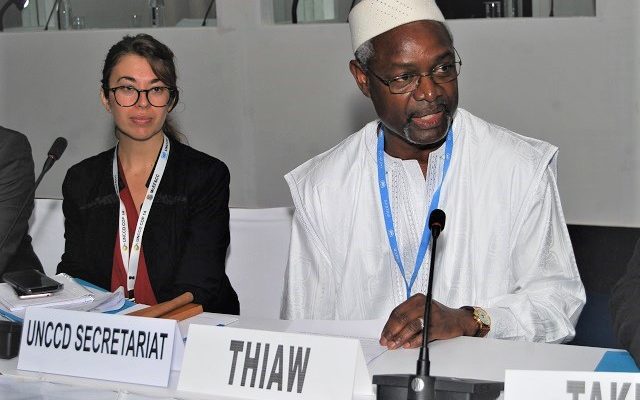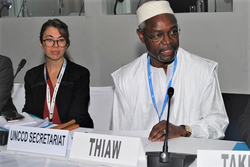Local and Regional Governments Gear Up to Tackle Land Degradation

ICLEI – Local Governments for Sustainability along with United Nations Convention to Combat Desertification (UNCCD) and with support from the Indian Ministry of Environment, Forest and Climate Change (MoEFCC), organised the Local and Regional Governments Day on the 7th of September, 2019.
The event was part of the 14th meeting of the Conference of the Parties (CoP) to the UNCCD, which took place from the 2nd to 13th of September, 2019 at the India Expo Centre and Mart in Greater Noida, India.
It marked a new phase of engagement of local and regional governments in the global efforts on land degradation.
Over the next 18 months, the world is prepared to achieve significant progress on dealing with climate change (the 2nd NDCs), nature (the global framework on biodiversity in the post2020 phase) as well as a very critical 10 years of the implementation era of SDGs, which will be supported with a stronger visibility of the New Urban Agenda.
The one-day event was graced with the presence and words of Mr. Ibrahim Thiaw, Executive Secretary, UNCCD and Dr. JR Bhatt, Scientist G, MoEFCC.
Mr. Thiaw, in his speech, acknowledged that cities are not just part of the problem but also part of the solution.
“There is need for circular economy to be integrated into urban planning, strengthen local economy, local food production and rural-urban synergies,” he added.
The event was attended by more than 100 participants from 4 continents and over 13 countries. Participants included mayors, deputy mayors as well as local and regional representatives from more than 25 cities as well as members of the civil society and senior Government of India officials.
Change in land use was identified as one of the primary factors causing land degradation, whether it be forest land being used for agriculture, or farming land being converted into housing plots.
Mr. Thiaw also pointed out that uncontrolled urban expansion was another major challenge.
Speaking on the same lines, Enkhee Sainbuyan, Ulaanbaatar City Government, Mongolia said, “There is huge urbanisation in Ulaanbaatar and everyone wants to own land. The city is expanding in an unplanned way. Some of the causes of land degradation there are rapid migration, outdated urban planning regulations and abandoned mining sites”.
The urban sprawl in peri-urban areas in particular, is considered to be the most important driving force for land degradation. Agricultural lands are having to yield to urban infrastructure such as roads and buildings, threatening land tenure sustainability in peri-urban areas. Hon’ble Mayor Shri G. Prakash Rao of Greater Warangal Municipal Corporation spoke about the challenges in managing 93 slums with one million inhabitants in addition to 90 slums not recognised by local authorities with 300,000 inhabitants.
When the agricultural production system breaks down, it is bound to impact the cities that are dependent on the hinterland. In the fight over control of resources, be it food, water or even livelihood, even peace is affected in urban areas as pointed out by the Hon’ble Mayor Mr. Ahmed Aziz Diallo of Dori in Burkina Faso.
In terms of solutions, there was consensus that local governments are drivers of local action and through local policies can improve governance mechanisms, especially in peri-urban areas. Some of the other points discussed and agreed upon are:
• Decentralisation plays an important factor, as local governments need to be empowered and be allowed a fair amount of autonomy, including provision and control over financial resources. They need to involve people in city planning, and integrate peri-urban areas which suffer from disconnect in governance systems.
• Local governments can prioritise use of space, develop municipal action plans, adapt existing land use plans, create green jobs through economic diversification, linked to land and promote green taxation and innovative financing. They should bring back natural life support systems in cities, such as by developing biodiversity parks and enhancing surrounding natural ecosystems that can help recharge groundwater, filter the air and neutralise the impact of land degradation.
• Capacity building for effective action and access to technology were identified by the Mayors as critical for sustainable urban – rural land management. Enhancing vertical integration mechanisms is also key to concerted action.
• It means to act on the ‘leave no one behind’ approach, the central commitment of the Sustainable Development Goals and other global frameworks including the Paris Agreement, the New Urban Agenda CBD Strategy Plan for Biodiversity in addition to the Global Land Neutrality Goal of UNCCD.
“The problem of climate change and global warming are knocking at the doors of local and regional governments because actions have to be taken by cities. I am glad to see conventions recognising this and including in COPs,” said Dr. Bhatt as he concluded the event with his remarks.
The outcomes from the event will feed-back to the nations through several upcoming global meetings and reporting processes in 2019 and 2020 such as the Biodiversity COP in China, the Climate COP in Chile and at ICLEI’s own annual convening on resilience and sustainable development.




